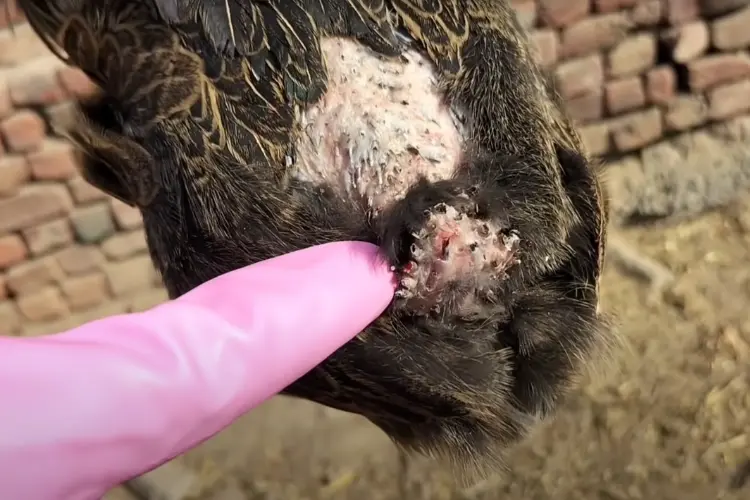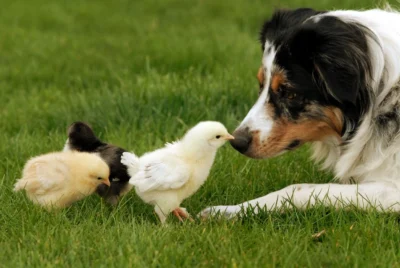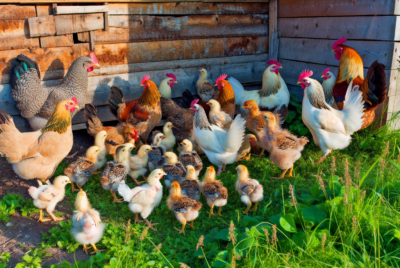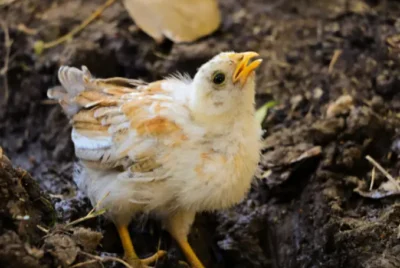Why Chickens Eat Feathers and How to Prevent It
Have you ever noticed your chickens eating feathers and wondered why? It’s a common but troubling problem that many chicken owners face. Not only is it strange to see, but it can also be a sign of bigger issues like stress or illness in your flock. You might feel worried and confused, not knowing how to stop this behavior or what it means for your chickens’ health.
In this article, we will talk about why chickens eat feathers and teach you simple ways to prevent it to help you take care of your flock and put your mind at ease.
Do Chickens Normally Eat Their Own Feathers?
No, chickens do not normally eat their own feathers, they usually do feather plucking or pull out their feathers, but they don’t eat them. Chicken-eating feathers often indicate an underlying problem in the flock. In some cases, feather eating can escalate into a more serious problem, such as feather-pecking or even cannibalism, especially if left unchecked.
If you notice your chickens eating feathers, it’s crucial to understand and address the cause. This may involve adjusting their diet, enriching their environment, or consulting with a veterinarian or poultry expert to make sure the health and well-being of your flock.
Reasons Why Do Chickens Eat Feathers
Infestation by Parasites
Parasites like mites or lice can irritate a chicken’s skin, leading them to peck at and consume their own feathers in an attempt to alleviate the discomfort. This behavior can become a habit if the infestation is not treated promptly.
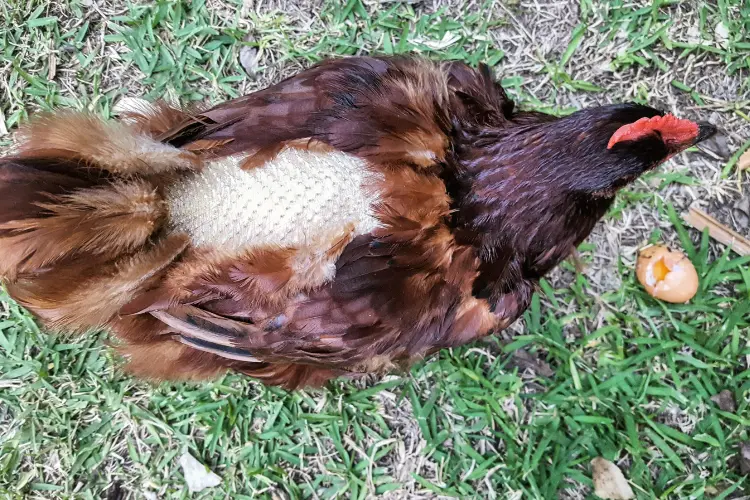
Elevated Temperatures Leading to Overheating
High temperatures can cause chickens to become overheated and stressed. This stress might manifest in abnormal behaviors, including pecking at and consuming feathers. Ensuring proper ventilation and shade can help alleviate this issue.
Intense Breeding Behavior
During mating, roosters may grab and pull at hens’ feathers. This behavior can lead to damaged feathers, attracting the chickens’ attention and causing them to peck at the feathers, sometimes eating them. Overly aggressive mating can exacerbate this problem.
Social Hierarchy and Pecking Order Dynamics
Chickens naturally establish a social hierarchy known as the “pecking order.” In this hierarchy, dominant birds may peck at and pull feathers from subordinate birds. Subordinates may then peck at and consume the dislodged feathers, either out of curiosity or as a stress response.
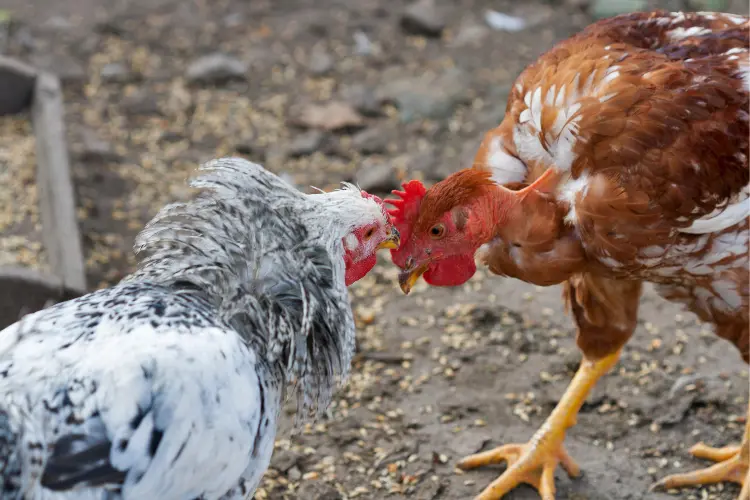
Excessive Population and Overcrowded Conditions
Overcrowding creates stress and competition among chickens, often leading to aggressive behaviors like feather pecking and eating. Providing enough space for chickens to move and forage comfortably can reduce this behavior.
Nutritional Deficiencies and the Effects of Aging
A lack of essential nutrients, particularly protein, can drive chickens to eat feathers, which contain protein-rich keratin. Aging may exacerbate nutritional deficiencies, as older birds may have different nutritional needs or struggle to compete for food, leading them to seek alternative protein sources like chicken feathers.
Excessive Bright Light
Chickens are sensitive to light, and excessive bright light can cause agitation and stress. This may lead to feather pecking and eating as a coping mechanism. Using proper lighting that mimics natural daylight patterns can help prevent this issue.
Existence of Deceased or Hurt Birds within the Group
The presence of injured or dead birds can cause distress and panic within the flock. Chickens may peck at and consume feathers from these birds out of curiosity or as a stress response. Prompt removal and proper care of injured birds can prevent this behavior.
Cyclical Molting with Changing Seasons
Molting is a natural process where chickens shed and replace their feathers. During molting, new feathers (known as pin feathers) emerge, which can be irritating to the bird. This discomfort might lead chickens to peck at and consume their own or other birds’ feathers. The availability of loose feathers during this period may also stimulate this behavior.
Insufficient Shelter and Living Space
A lack of shelter and appropriate living space can lead to discomfort and stress, prompting chickens to engage in abnormal behaviors like feather eating. Providing adequate shelter, nesting areas, and space to roam helps create a comfortable environment, reducing the likelihood of this issue.
How to Stop Chickens from Eating Feathers
Adjusting their Diet
Ensuring that your chickens’ diet is well-balanced and rich in essential nutrients, particularly protein, can alleviate feather eating. Sometimes, chickens eat feathers to compensate for protein deficiency, especially for laying hens for egg production. Feeding them with a properly formulated poultry diet or adding protein-rich supplements can correct this issue. You can also try comfrey as feed to your chicken.

Combatting Parasitic Infestations
If the feather eating is caused by irritation from parasites like mites or lice, treating the infestation is crucial. Regular checks for parasites and the application of appropriate treatments, such as sprays or dusts specifically designed for poultry, can prevent and resolve these infestations.
Ensuring Optimal Coop Temperature
Overheating can lead to stress and abnormal behaviors like feather eating. Ensuring proper ventilation, shade, and access to fresh water can help maintain a comfortable temperature in the coop and reduce stress-related behaviors.
Providing Freedom for Roaming
Overcrowding and lack of environmental stimulation can lead to feather eating. Allowing backyard chickens to roam in a safe and enriched environment provides them with the opportunity to forage, scratch, and explore. This natural behavior can reduce stress and boredom, diminishing the tendency to eat feathers.
Consulting a Veterinarian’s Advice
If the problem persists despite trying the above interventions, consulting a poultry veterinarian or expert may be necessary. A professional can conduct a thorough examination, identify any underlying health issues or nutritional deficiencies, and recommend specific treatments or adjustments to the flock’s care.
Tips to Control Chicken Eat Feathers
- Beak Trimming: This is a more controversial strategy and involves trimming the tip of the chicken’s beak to prevent it from causing harm. It should be done correctly to avoid causing pain or injury to the bird and should be seen as a last resort after other methods have failed.
- Lowering Chicken Coop Temperature: Chickens might peck more if they are uncomfortably warm. By lowering the temperature slightly, you might reduce the motivation for this behavior. However, it’s essential to ensure that the temperature keeps within a comfortable range for the birds.
- Red Bulbs: Red bulbs can help reduce the visibility of blood or red skin exposed from feather loss. Chickens might peck more at these areas if they are more noticeable. However, as you noted, it’s essential to ensure chickens get the right light spectrum for healthy egg production.
- Chickens Free Range: Allowing chickens more space to roam can reduce stress and aggression. In confined spaces, boredom and competition for resources can increase the likelihood of feather pecking.
- Blinders or Plastic Peepers: These are small plastic devices attached to a chicken’s beak to limit forward vision, reducing aggressive pecking by making it harder for the bird to see straight ahead.
- Shiny Items: Distraction can be an effective way to reduce feather pecking. Shiny items can entertain chickens, providing an alternative focus to pecking at their flock-mates.
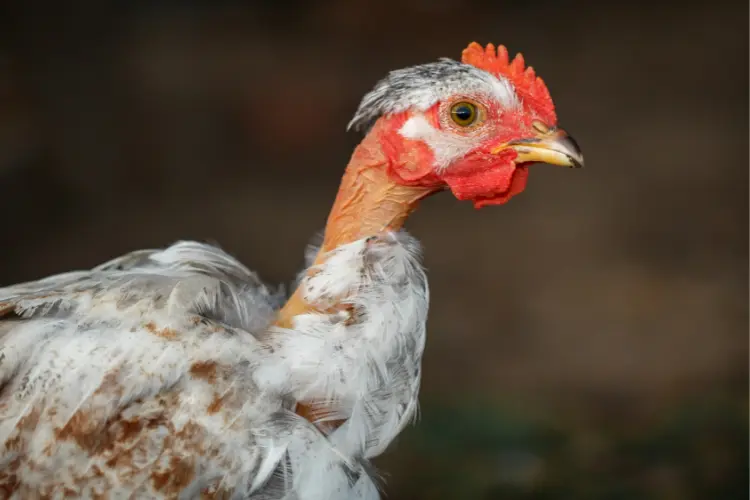
What is the Difference Between Feather Pecking and Feather Eating?
Feather pecking and feather eating are two distinct behaviors in birds. Feather pecking involves one bird pecking at the feathers of another, which can range from gentle preening to aggressive feather picking that causes damage. It may be caused by boredom, stress, dominance behavior, or nutritional deficiencies and can lead to feather loss and skin injuries.
Feather eating, on the other hand, is the consumption of feathers by birds, usually resulting from nutritional deficiencies or behavioral issues like boredom. Unlike pecking, which can cause physical damage to another bird, eating feathers can lead to digestive issues within the bird consuming them. While both behaviors might arise from similar underlying problems, they manifest differently and can have unique consequences for the birds involved.
Conclusion
Understanding the root causes of why chickens eat feathers and implementing appropriate solutions can effectively stop this behavior. These solutions are not simply a matter of addressing a single factor but require comprehensive care and attention to various aspects of your chickens’ lives. This will not only prevent feather-eating behavior but also contribute to the overall well-being and productivity of your flock.

